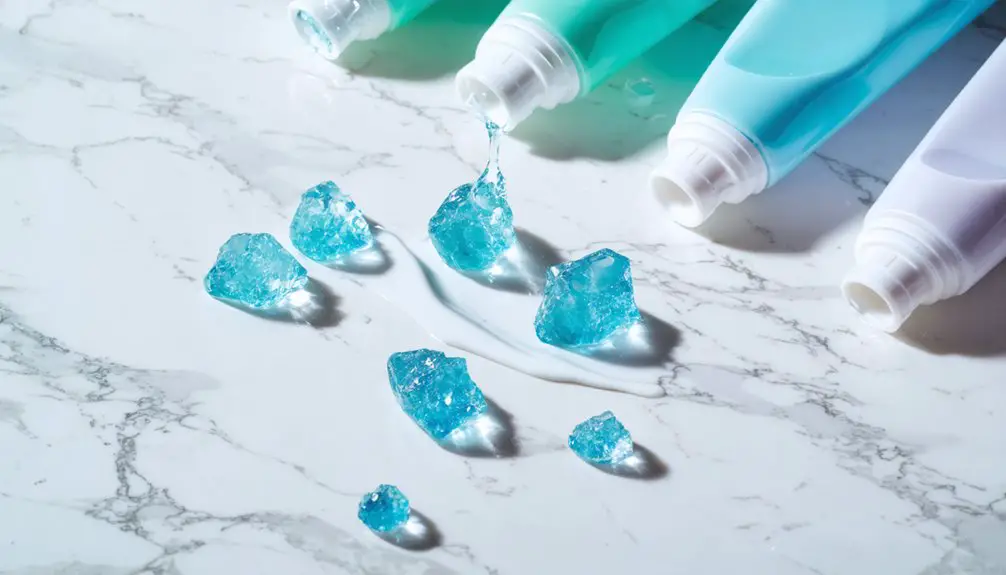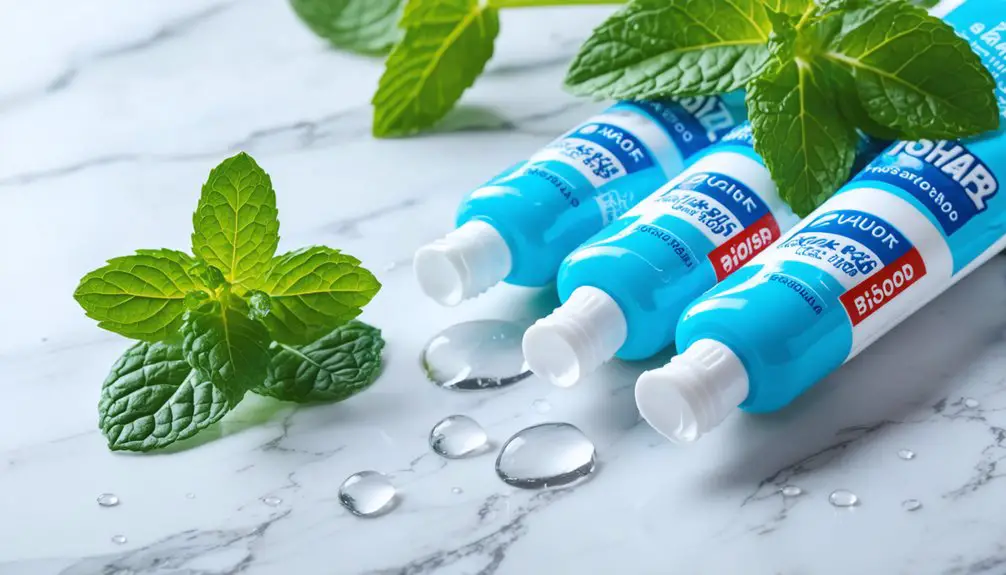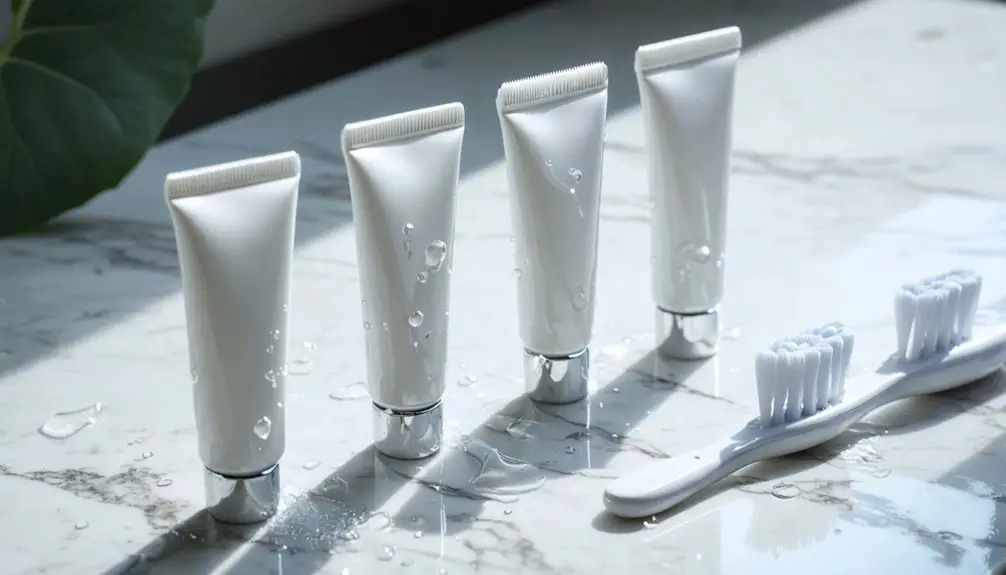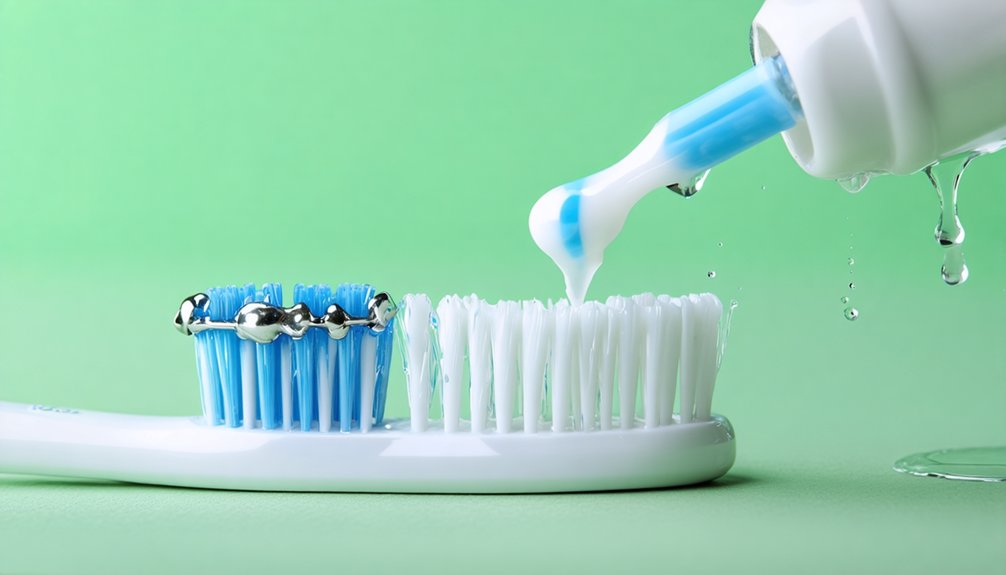You’ll find significant improvements in your oral health by selecting a tartar control toothpaste that contains proven ingredients like sodium hexametaphosphate and zinc compounds. Leading brands such as Crest, Colgate, and Arm & Hammer offer clinically validated formulations that effectively prevent calcium mineralization while protecting enamel. For best results, choose products combining pyrophosphates with fluoride and antimicrobial agents. Understanding the science behind these ingredients will help you make an informed decision for your dental care needs.
Key Takeaways
- Crest and Colgate lead the market with scientifically proven formulations containing sodium hexametaphosphate and pyrophosphates for superior tartar control.
- Look for toothpastes with zinc compounds and fluoride, which provide both antimicrobial protection and enamel strengthening benefits.
- Arm & Hammer’s baking soda-based formulas offer gentle yet effective tartar control while being less abrasive on tooth enamel.
- Tom’s of Maine provides ADA-approved natural alternatives for those seeking organic ingredients while maintaining effective tartar prevention.
- Choose multi-benefit formulations that combine tartar control with whitening agents for both protection and aesthetic improvement.
Understanding Tartar and Its Impact on Oral Health
While many people are familiar with dental plaque, tartar presents a more serious concern for oral health. When plaque isn’t removed regularly, it mineralizes with saliva within 24 to 72 hours, forming a hard, yellow or brownish substance called tartar or dental calculus.
Unlike plaque, you can’t remove tartar through regular brushing and flossing. Dental professionals must remove tartar due to its strong bond with tooth enamel. Understanding effective plaque removal techniques is essential for tartar prevention tips, as tartar buildup can lead to serious complications.
Once formed, tartar creates a rough, porous surface that attracts more bacteria and plaque, potentially causing gingivitis, periodontitis, and tooth decay. It can accumulate both above and below your gumline, making professional intervention necessary. Regular use of anti-tartar toothpaste can help prevent plaque from hardening into tartar.
Without treatment, you’ll face increased risks of gum recession, bone loss, and persistent bad breath.
Key Ingredients That Combat Tartar Build-up
When you’re looking to prevent tartar buildup, it’s essential to understand the scientifically proven ingredients in your toothpaste.
The most effective anti-tartar formulations contain pyrophosphates and zinc compounds, which work synergistically to inhibit mineral crystallization and prevent calculus formation. Clinical studies have shown that toothpastes containing sodium hexametaphosphate demonstrate superior performance in reducing tartar.
These active ingredients, combined with fluoride for enamel protection, create an all-encompassing defense against tartar accumulation while supporting overall oral health. Some varieties incorporate antibiotic triclosan to eliminate harmful bacteria that contribute to plaque formation.
Essential Anti-Tartar Compounds
Modern tartar control toothpastes incorporate several key compounds that work synergistically to prevent calculus formation.
Pyrophosphate effectiveness stems from its ability to disrupt mineral crystal growth and sequester calcium, directly interfering with tartar mineralization along your gum lines. Sodium pyrophosphate is specifically formulated to control plaque and prevent tartar buildup.
Zinc compounds benefits include both antimicrobial action and plaque matrix disruption, particularly through zinc citrate’s dual-action approach to oral hygiene.
These primary compounds work alongside other essential ingredients like triclosan, which targets biofilm formation, and carefully calibrated abrasives that mechanically remove plaque without damaging enamel. The addition of silica and carbonate provides gentle yet effective scrubbing action against plaque buildup.
Fluoride compounds, especially stannous fluoride, complement the anti-tartar action by strengthening your enamel and providing antimicrobial protection.
Together, these compounds create a thorough defense against tartar accumulation when you maintain consistent daily use.
Understanding Ingredient Effectiveness
Through extensive clinical research and development, key ingredients in tartar control toothpastes demonstrate specific mechanisms of action that effectively combat calculus formation.
Maintaining the proper fluoride concentration in toothpaste ensures optimal protection against cavity formation while fighting tartar.
You’ll find pyrophosphates working to prevent calcium from binding to teeth, while zinc compounds, particularly zinc citrate, inhibit crystal growth and suppress bacterial proliferation. This ingredient synergy creates a powerful defense against tartar buildup.
Regular use of these ingredients helps prevent soft plaque buildup from hardening into tartar deposits. For enhanced plaque management, citrates work alongside these compounds by reducing mineral accumulation on your enamel surface.
When combined with mild abrasives like calcium carbonate and silica, these formulations deliver thorough protection. While activated charcoal contributes to stain removal, the primary anti-tartar effectiveness comes from the scientifically proven combination of pyrophosphates, zinc salts, and citrates working in concert.
Top-Rated Tartar Control Brands in the Market
Several leading tartar control toothpaste brands have established themselves as effective solutions for preventing calculus buildup on teeth. Crest and Colgate lead with scientifically validated formulations, incorporating sodium hexametaphosphate and pyrophosphates to inhibit plaque mineralization.
You’ll find Arm & Hammer’s baking soda-based products offer gentle abrasiveness while maintaining enamel integrity, supported by consistent user testimonials. These products help reduce gum inflammation and eliminate bad breath.
For those seeking natural alternatives, Tom’s of Maine provides ADA-approved tartar control innovations using plant-based ingredients and milder abrasives. The company undergoes quality re-evaluation process every three years to maintain their ADA approval status.
While specialty brands like Parodontax integrate unique ingredient combinations, the most reliable options remain those with established clinical research and ADA Seal of Acceptance.
Each brand’s effectiveness stems from their distinct approach to preventing tartar formation while ensuring ideal oral health protection.
How Tartar Control Toothpastes Actually Work
When you brush with tartar control toothpaste, chelating agents like pyrophosphates and SHMP actively bind to calcium ions in your saliva, preventing the mineralization process that leads to tartar formation.
These chemical agents work alongside mild abrasives to disrupt plaque accumulation while specialized polymers extend the protective effects between brushings.
Your toothpaste’s active ingredients create a protective barrier by modifying tooth surface charges and inhibiting crystal growth, effectively blocking the mineral deposits that would otherwise harden into calculus.
Chemical Plaque Prevention Methods
Modern tartar control toothpastes employ multiple chemical mechanisms to prevent plaque mineralization and subsequent calculus formation.
You’ll find chelating agents like pyrophosphates and SHMP that bind calcium ions, reducing calculus by up to 50%. These chemical agents work alongside crystal growth inhibitors that delay plaque mineralization, making it easier to remove through brushing.
Advanced formulations target the plaque matrix itself through anti-adhesive compounds and surface-active agents.
Some toothpastes contain silicone oil that creates a protective barrier on your teeth, resisting bacterial colonization. When combined with slow-release antimicrobial layers, these formulations provide extended protection without systemic risks.
The most effective products often incorporate polymer additives that stabilize active ingredients, particularly when combined with fluoride for enhanced anti-calculus efficacy.
Mineral Blocking Action
Tartar control toothpastes rely on specific chemical mechanisms that block mineral accumulation on tooth surfaces.
These formulations utilize chelating agents like pyrophosphates, SHMPs, and EDTA to bind excess calcium ions in your saliva, preventing them from crystallizing into tartar. The chelators work by controlling mineral saturation levels and modifying calcium ion interactions at the tooth surface.
You’ll find ingredients like zinc compounds that further inhibit crystal formation while providing antimicrobial benefits.
Surface charge modulation also plays a key role – EDTA and similar compounds enhance the tooth’s natural negative charge, making it harder for plaque and minerals to attach.
While these mechanisms can’t remove existing tartar, they effectively slow new formation by up to 50% when used consistently in your oral care routine.
Daily Protection Mechanisms
Through multiple synergistic mechanisms, tartar control toothpastes provide extensive daily protection against calculus formation on your teeth. When you brush regularly with these specialized formulations, you’ll activate powerful protective elements that work continuously to maintain your oral health.
- The toothpaste’s antibacterial agents, including stannous fluoride benefits, actively combat plaque-causing bacteria while strengthening your enamel against acid attacks.
- Hydroxyapatite components deposit directly onto your tooth surfaces, promoting remineralization and creating smoother enamel that resists plaque adhesion.
- Anti-inflammatory ingredients support gum health by soothing irritated tissue and reducing sensitivity, while mild abrasives assist in mechanical plaque removal before it hardens into tartar.
These mechanisms work together to disrupt biofilm formation and prevent the mineralization process that leads to tartar buildup.
Choosing the Right Formula for Your Needs
Selecting an effective tartar control formula requires careful consideration of both active ingredients and your specific oral health needs.
When evaluating toothpaste preferences, focus on products containing proven ingredients like sodium hexametaphosphate and pyrophosphates, which effectively bind calcium and prevent tartar formation.
For ideal ingredient transparency, examine whether the formula includes zinc compounds for bacterial control and fluoride for enamel protection.
If you’re dealing with sensitivity, choose products that combine tartar control with desensitizing agents. Those seeking whitening benefits should look for multi-benefit formulations that incorporate stain-removing components.
Consider organic options with natural antibacterial ingredients if you prefer alternative formulations.
Remember that consistent twice-daily use of your chosen formula, regardless of type, remains vital for achieving noticeable tartar reduction results.
Safety and Abrasiveness Ratings Explained
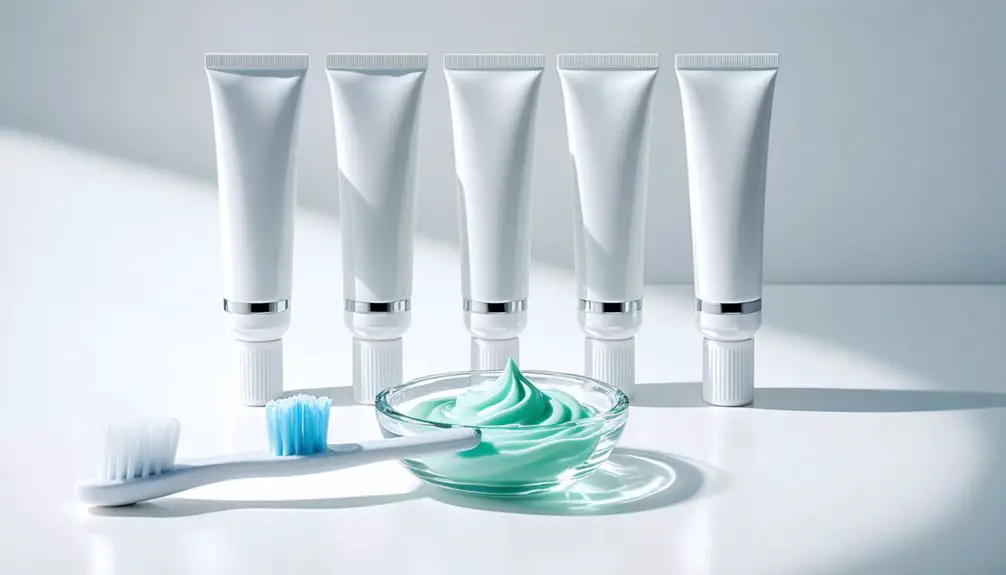
Understanding toothpaste safety standards begins with the American Dental Association’s Seal of Acceptance – a rigorous certification process that evaluates both efficacy and abrasiveness levels.
When making toothpaste comparisons, you’ll want to focus on the Relative Dentin Abrasion (RDA) rating, which measures how gentle or aggressive a formula is on your teeth.
For ideal dental health, consider these critical safety factors:
- Choose products with RDA values below 100 for daily use, as they effectively remove plaque while protecting enamel.
- Look for ADA-approved formulas containing fluoride and safe tartar-control agents like pyrophosphates.
- Avoid toothpastes with RDA values approaching 250, especially if you have sensitive teeth or receding gums.
Chemical effectiveness must balance with abrasiveness for safe, long-term tartar control.
Combining Tartar Control With Other Benefits
Modern tartar control toothpastes deliver multiple oral health benefits through sophisticated formulations that combine anti-calculus agents with cavity protection, antibacterial action, and cosmetic enhancements.
You’ll find these advanced formulations incorporate fluoride and pyrophosphates working synergistically with stannous fluoride or triclosan for thorough protection. While targeting tartar formation, they simultaneously strengthen enamel, combat harmful bacteria, and prevent stains.
Many brands now offer various flavor preferences and packaging innovations to encourage consistent use. The multi-benefit approach means you’re getting cavity prevention, gum health support, and whitening effects alongside tartar control.
Sodium hexametaphosphate provides both anti-calculus and stain prevention benefits, while zinc salts enhance bacterial control. These combined advantages make contemporary tartar control toothpastes an efficient choice for maintaining peak oral health.
Professional Recommendations and Clinical Studies

Dental professionals rely on extensive clinical research to recommend effective tartar control toothpastes for their patients. Studies confirm that specific active ingredients greatly reduce tartar formation when incorporated into daily oral hygiene routines.
Clinical evidence supports these proven approaches:
Scientific research validates multiple proven strategies for effective tartar control through specialized toothpaste formulations and ingredients.
- Sodium hexametaphosphate-based formulations demonstrate up to 55% greater anti-calculus benefits compared to regular toothpaste.
- Stannous fluoride provides 12-hour antibacterial protection while effectively reducing plaque accumulation.
- Pyrophosphate combinations with zinc salts actively inhibit mineral crystallization on teeth.
While these ingredients show remarkable effectiveness in preventing new tartar buildup, it’s crucial to maintain regular dental visits since no toothpaste can remove existing calculus.
Professional cleaning remains necessary for ideal oral health outcomes.
Best Practices for Maximum Tartar Prevention
To maximize tartar prevention, you’ll need a thorough approach that combines scientifically proven ingredients with proper oral hygiene techniques.
Implement a twice-daily brushing routine using toothpaste containing pyrophosphates, stannous fluoride, or sodium hexametaphosphate. These active ingredients effectively inhibit tartar crystallization on tooth surfaces.
Complement your brushing with proper flossing techniques, utilizing either traditional floss or water flossers to remove interdental plaque before it mineralizes.
Your dietary choices considerably impact tartar formation – minimize sugar and starch consumption while increasing fibrous fruits and vegetables. Stay hydrated to maintain ideal saliva flow, which naturally helps neutralize harmful acids.
For enhanced results, consider toothpastes that combine multiple anti-plaque agents, as clinical studies show superior tartar control with multi-agent formulations.
Maintaining Long-Term Oral Health Results
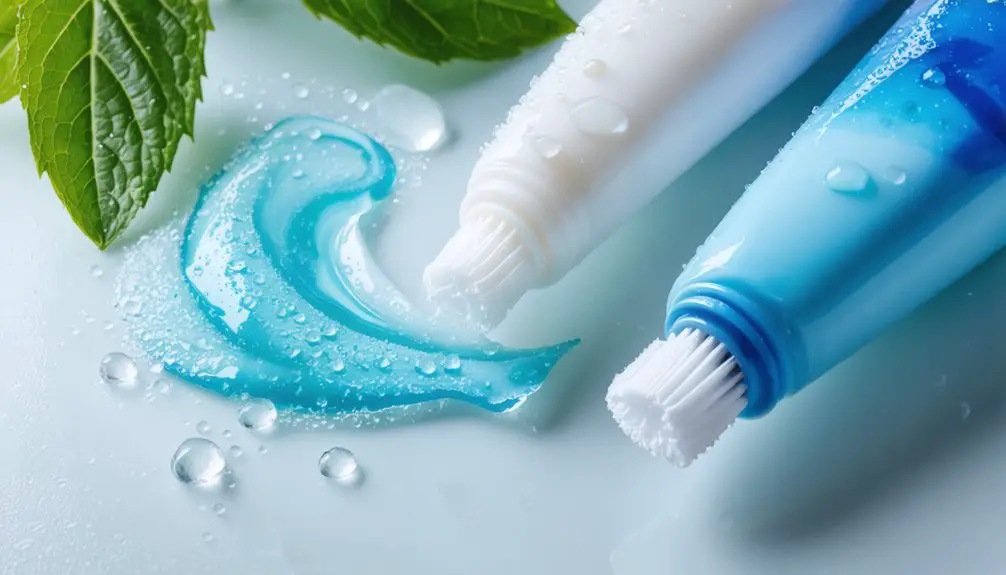
You’ll achieve ideal tartar control by maintaining proper brushing technique twice daily with clinically-proven toothpaste formulations containing active ingredients like triclosan or stannous fluoride.
To maximize long-term benefits, make sure you’re using correct pressure and spending adequate time on all tooth surfaces while incorporating regular flossing into your routine.
Schedule professional dental cleanings every 6 months to remove hardened calculus that brushing alone can’t address, as this thorough approach yields sustained improvements in oral health outcomes.
Daily Brushing Best Practices
While maintaining ideal oral health requires consistent daily practices, proper brushing technique forms the cornerstone of effective tartar control. Your brushing frequency should include two thorough sessions daily, each lasting two minutes, to optimize plaque removal and minimize tartar formation.
For maximum effectiveness, follow these essential steps:
- Use a soft-bristled toothbrush and fluoride toothpaste, replacing your brush every 3-4 months.
- Employ circular or vertical strokes targeting all tooth surfaces, including buccal, lingual, and chewing areas.
- Pay particular attention to gingival margins where plaque tends to accumulate, incorporating interdental cleaning devices for all-encompassing care.
Professional Care Schedule Tips
Regular professional dental cleanings serve as a cornerstone of effective tartar control and long-term oral health maintenance. You’ll need to schedule these essential visits every six months to remove accumulated tartar that brushing alone can’t eliminate.
However, if you have significant buildup or gum disease, your dentist may recommend more frequent cleanings. Your personalized schedule should align with your specific oral health needs.
Professional cleaning appointments allow for early detection of potential issues while enabling minimally invasive interventions. These visits can reduce cavity formation by up to 40% and help preserve your gum health.
Between appointments, maintain consistent home care routines, including twice-daily brushing with tartar-control toothpaste and daily flossing, to maximize the benefits of your professional cleanings and protect your oral health investment.
Frequently Asked Questions
Can I Use Tartar Control Toothpaste With Braces or Dental Implants?
You can safely use tartar control toothpaste with braces and implants as part of your dental hygiene routine. It’s beneficial for braces care when combined with specialized brushing techniques and orthodontic cleaning tools.
How Long Does It Take to See Results From Tartar Control Toothpaste?
Want visible improvements in your smile? You’ll notice results from tartar control toothpaste’s effectiveness within 8-12 weeks of consistent twice-daily use, with clinical studies showing up to 34% reduction in buildup.
Should Children Use Tartar Control Toothpaste Products?
You shouldn’t give children tartar control toothpaste until their teenage years. For children’s dental health, stick to age-appropriate fluoride toothpaste and proper brushing techniques as primary tartar prevention methods.
Can Tartar Control Toothpaste Cause Tooth Discoloration Over Time?
Yes, your tartar control toothpaste’s ingredients can cause discoloration through enamel wear, exposing yellower dentin beneath. Abrasive components meant to fight tartar buildup can gradually thin your tooth’s protective surface.
Is It Safe to Swallow Small Amounts of Tartar Control Toothpaste?
You shouldn’t swallow toothpaste ingredients, even in small amounts. While occasional ingestion of a pea-sized portion isn’t typically harmful, dental safety best practices recommend spitting out all toothpaste during brushing.
References
- https://implantandcosmeticdentistry.com/best-type-of-toothpaste/
- https://www.williamsonperio.com/wp-content/uploads/2014/07/Toothpaste-Abrasiveness-Ranked-by-RDA.pdf
- https://smilesonic.com/which-toothpaste-works-for-tartar-can-any-toothpaste-actually-dissolve-it/
- https://www.schwimmerdental.com/blog/best-toothpaste-for-plaque-removal
- https://www.reallifedentalcare.com/glossary/tartar/
- https://www.pickettfamilydental.com/blog/difference-between-plaque-tartar/
- https://www.goldenstatedentistry.com/blog/dental-tartar-calculus-causes-prevention-and-removal
- https://my.clevelandclinic.org/health/diseases/25102-tartar
- https://my.clevelandclinic.org/health/diseases/10953-plaque
- https://www.webmd.com/oral-health/weighing-your-toothpaste-options
